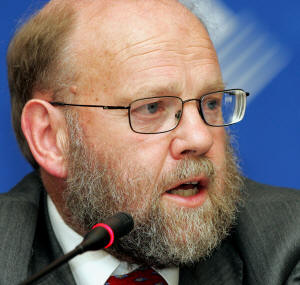|
Wilmut, along with Keith Campbell from the animal sciences
research institute in Scotland, generated news headlines and
heated ethical debates in 1996 when they created Dolly, the
first mammal to be cloned from an adult cell.
"He led efforts to develop cloning, or nuclear transfer,
techniques that could be used to make genetically modified
sheep. It was these efforts which led to the births of Megan and
Morag in 1995 and Dolly in 1996," the university said in a
statement.
Dolly, named after country singer Dolly Parton, was the first
mammal to be cloned from an adult cell, using a process called
somatic cell nuclear transfer (SCNT).
This involved taking a sheep egg, removing its DNA and replacing
it with DNA from a frozen udder cell of a sheep that died years
before. The egg was then zapped with electricity to make it grow
like a fertilized embryo. No sperm were involved.
Dollyís creation triggered fears of human reproductive cloning,
or producing genetic copies of living or dead people, but
mainstream scientists have ruled this out as far too dangerous.
Wilmut, who was born near Stratford-upon-Avon, attended the
University of Nottingham, initially to study agriculture, before
switching to animal science.
He moved to the University of Edinburgh in 2005, received a
knighthood in 2008 and retired from the university in 2012.
(Reporting by Muvija M; editing by Michael Holden and Andrew
MacAskill)
[© 2023 Thomson Reuters. All rights
reserved.] Copyright 2022 Reuters. All rights reserved. This material may not be published,
broadcast, rewritten or redistributed.
Thompson Reuters is solely responsible for this content.

|
|




